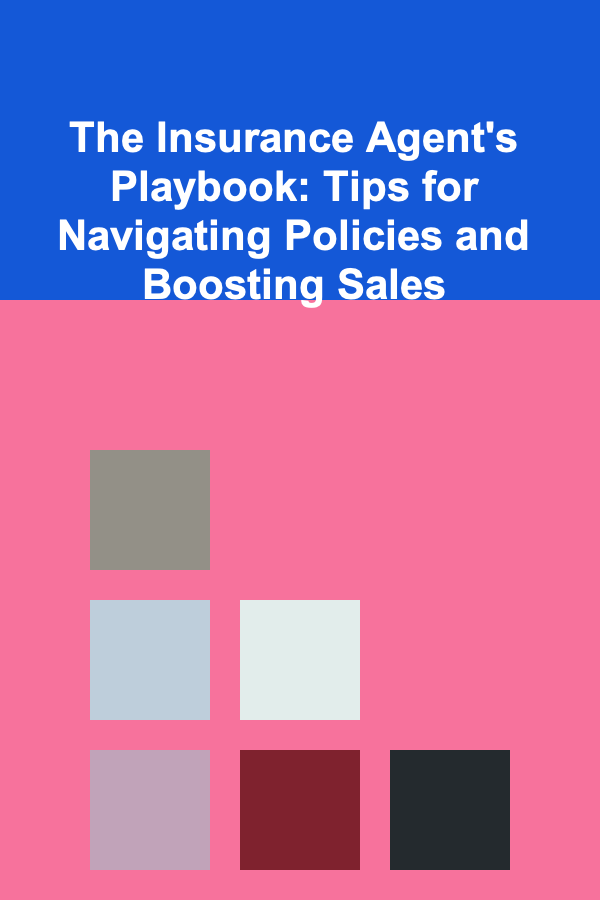
The Insurance Agent's Playbook: Tips for Navigating Policies and Boosting Sales
ebook include PDF & Audio bundle (Micro Guide)
$12.99$7.99
Limited Time Offer! Order within the next:

As an insurance agent, navigating the complex world of policies, claims, and customer needs can be challenging. However, mastering these aspects can elevate your sales performance and turn you into a trusted advisor. This actionable guide is designed to provide you with practical strategies that will not only enhance your understanding of insurance policies but also help you boost your sales and build long-lasting relationships with clients.
Understanding Insurance Policies: The Foundation of Your Success
Insurance products are complex, and it's critical that you have a deep understanding of the policies you sell. Whether you're offering life, health, auto, home, or business insurance, each policy type comes with its unique features, benefits, exclusions, and limitations. Knowledge is power in this field, and the more informed you are, the better positioned you'll be to serve your clients and close sales effectively.
Key Areas to Master:
1. Policy Components
Understanding the key components of an insurance policy is essential. These typically include:
- Premiums: The amount a client pays periodically for coverage.
- Deductibles: The amount a client must pay out-of-pocket before the insurance kicks in.
- Coverage Limits: The maximum amount the insurance company will pay out in the event of a claim.
- Exclusions: Specific situations or conditions that aren't covered by the policy.
- Riders and Add-Ons: Additional coverage options that can be added to the policy.
2. Types of Insurance Products
Each type of insurance product caters to different needs:
- Life Insurance: Provides financial security to a policyholder's beneficiaries in the event of their death. Familiarize yourself with both term life and whole life policies.
- Health Insurance: Covers medical expenses, including doctor visits, hospital stays, and prescriptions.
- Auto Insurance: Protects vehicles against damage, theft, and liability.
- Homeowners and Renters Insurance: Protects homes and personal belongings from events like fire, theft, or natural disasters.
- Business Insurance: Provides coverage for businesses against risks such as property damage, liability claims, and employee injuries.
Actionable Tips:
- Regularly review and update your knowledge on the products you sell. Insurance products evolve, and staying informed will keep you ahead of the competition.
- Use comparison tools or charts to simplify complex policy details for clients. This allows you to present policy options clearly and efficiently.
Prospecting and Generating Leads: Filling Your Pipeline
The foundation of every successful insurance career lies in a consistent flow of prospects. The challenge, however, is how to identify, attract, and convert leads into clients. Effective prospecting requires a blend of strategy, creativity, and persistence.
Actionable Techniques:
1. Utilize Your Network
Start by leveraging your existing connections. Family, friends, colleagues, and acquaintances can often serve as an excellent source of referrals. Additionally, existing clients who are happy with your service can become your most valuable advocates. Ask them for referrals, and offer incentives or bonuses in return for new leads.
2. Target Specific Niches
Identify a target demographic based on the policies you specialize in. For example, if you sell life insurance, you might target young professionals, young families, or retirees. Tailoring your message to a specific group increases the chances of success because it resonates with their needs and concerns.
3. Use Social Media and Online Platforms
Social media platforms like LinkedIn, Facebook, and Instagram can be powerful tools for lead generation. Regularly post informative content that answers common questions about insurance. Engaging posts and consistent content can increase your visibility and attract potential clients. Additionally, using targeted ads on these platforms can help you reach specific audiences.
4. Attend Networking Events
Networking events provide opportunities to meet new prospects and establish yourself as a knowledgeable resource. Whether at local community events, conferences, or industry-specific trade shows, these settings allow you to interact face-to-face and build relationships.
Example:
Suppose you're focusing on auto insurance. You could attend car shows or automotive meetups where your ideal target audience is present. By positioning yourself as an expert on insurance for vehicle owners, you can build trust with potential clients.
Building Rapport and Trust: The Key to Long-Term Relationships
Successful insurance sales aren't just about closing deals; they're about building long-lasting relationships with clients. When clients trust you, they're more likely to return for additional coverage, refer others to you, and provide long-term business.
Actionable Techniques:
1. Ask the Right Questions
Start every interaction by asking open-ended questions that allow clients to share their personal concerns and needs. Instead of asking, "Do you need life insurance?" ask, "What are your primary concerns regarding your family's financial future?" This provides you with the insights necessary to recommend the best coverage.
2. Practice Active Listening
Pay attention to what clients are saying and validate their feelings. Reflect back what you hear, ensuring that you understand their concerns and are addressing them appropriately. Active listening fosters a deeper connection and demonstrates that you care about their needs.
3. Show Empathy
Empathy is crucial when dealing with clients. Whether they're worried about the financial security of their family or the cost of coverage, showing understanding and compassion can go a long way in building trust.
4. Be Transparent and Honest
Clients appreciate transparency. Clearly explain the terms of the policies you recommend, the costs involved, and any exclusions or limitations. Being upfront helps avoid misunderstandings and builds credibility.
Example:
If a client expresses concern about their ability to afford a policy, empathize with their situation. Instead of rushing to make a sale, you might suggest alternatives, such as a more affordable policy or options for adjusting their coverage in the future.
Closing the Sale: Turning Prospects into Clients
Closing is the culmination of the work you've put in to understand your client's needs, build trust, and present the right policy. It's where the relationship you've developed pays off, but it requires finesse.
Actionable Techniques:
1. Create a Sense of Urgency
While you don't want to pressure clients, gently reminding them of the benefits of taking action sooner can help seal the deal. This could be as simple as pointing out how insurance premiums increase with age, or how waiting could result in a lack of coverage at a critical time.
2. Overcome Objections Effectively
Objections are common in any sales process, and the key to overcoming them is understanding the client's concern and offering a well-thought-out response. Whether it's a concern about price, coverage, or terms, take the time to address the objection thoughtfully.
3. Reinforce the Benefits
Always focus on how the policy you are selling aligns with the client's needs. Reinforce how it will provide peace of mind, protect their loved ones, or help secure their future.
4. Make the Process Simple
Ensure that the sign-up process is easy to understand and convenient. Offer clear steps on how to proceed, and make sure they know exactly what is required of them to finalize the policy.
Example:
When a client hesitates about committing to a life insurance policy due to cost, show them how the long-term benefits outweigh the initial expense. You might use a cost comparison or outline how the policy provides financial security in case of unexpected life events.
Managing Client Relationships for Long-Term Success
Once you've closed the sale, your work isn't finished. Building a long-term relationship with your clients is essential for continued business. Happy clients are more likely to renew their policies, purchase additional products, and refer others to you.
Actionable Techniques:
1. Schedule Regular Follow-Ups
Stay in touch with clients through periodic follow-ups. This can be a simple check-in or a more formal policy review. Keeping the lines of communication open ensures that your clients are satisfied with their coverage and keeps you top-of-mind for any future needs.
2. Offer Value-Added Services
Clients will appreciate receiving additional value beyond the sale itself. You could send them updates on insurance trends, tips on reducing premiums, or reminders about policy renewals.
3. Encourage Referrals
Happy clients are your best marketing tool. After you've delivered excellent service, ask for referrals. Offering incentives for successful referrals can motivate clients to spread the word about your services.
Example:
If a client has successfully renewed their home insurance policy, send them a note expressing your gratitude and gently ask if they know anyone else who might benefit from your services. A referral reward or discount on their next premium can incentivize them to spread the word.
Conclusion: The Road to Success
Becoming a successful insurance agent requires a blend of product knowledge, relationship-building skills, and an ability to close sales effectively. By mastering these elements and consistently applying the strategies outlined in this guide, you'll be well-equipped to navigate the complexities of insurance and boost your sales. The key to long-term success lies in treating each client as an individual, addressing their specific needs, and providing exceptional value throughout the entire insurance journey.

How to Make DIY Acoustic Panels for Your Home
Read More
How to Make Money Online as an SEO Specialist: 10 Actionable Ideas
Read More
How to Protect Your Home from Seasonal Burglary Trends
Read More
How to Stage Your Home After a Renovation for Maximum Impact
Read More
How to Turn Your Deep Learning Projects into Profitable Products
Read More
Recruiter Secrets: Navigating the Modern Hiring Process with Expert Tips
Read MoreOther Products

How to Make DIY Acoustic Panels for Your Home
Read More
How to Make Money Online as an SEO Specialist: 10 Actionable Ideas
Read More
How to Protect Your Home from Seasonal Burglary Trends
Read More
How to Stage Your Home After a Renovation for Maximum Impact
Read More
How to Turn Your Deep Learning Projects into Profitable Products
Read More